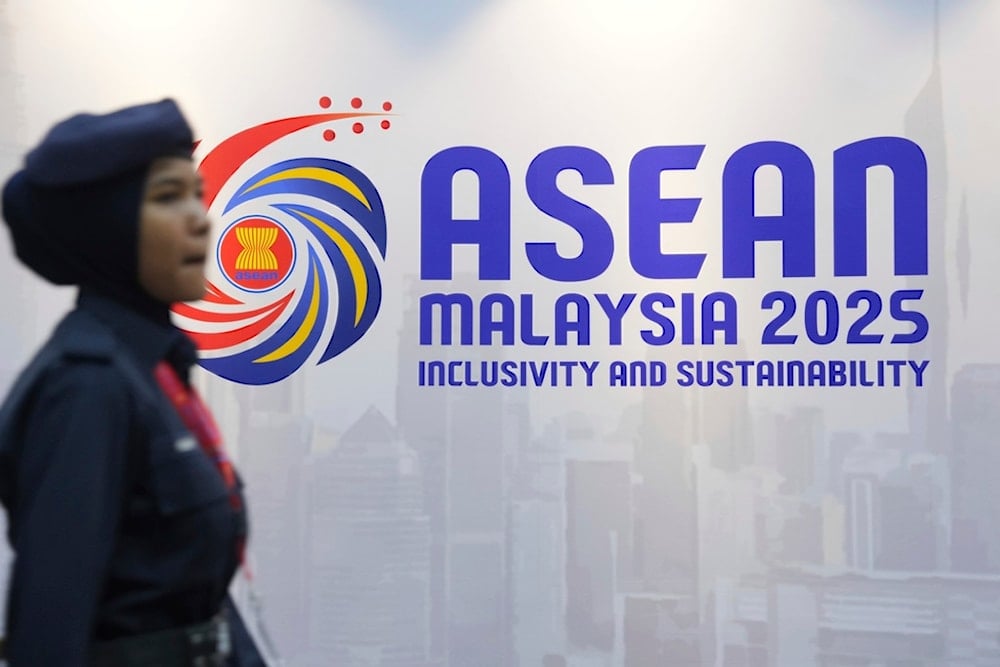ASEAN ministers warn of tariff fallout as Trump reimposes trade duties
As ASEAN leaders convene in Kuala Lumpur, rising concerns over US tariff threats are unfolding alongside a broader regional pivot toward BRICS as an alternative economic and geopolitical bloc.
-

A Malaysian police officer walks in front of the logo for the Association of Southeast Asian Nations (ASEAN) meeting at its venue in Kuala Lumpur, Malaysia, on May 24, 2025. (AP Photo/Vincent Thian)
Southeast Asian countries are voicing growing alarm over the United States' escalating tariff threats just as foreign ministers gather in Kuala Lumpur for a pivotal ASEAN summit. According to a draft joint communique obtained by AFP, ASEAN leaders are expected to warn that "unilateral actions relating to tariffs" are "counterproductive" and risk "exacerbating global economic fragmentation."
Though the statement avoids naming the United States directly, the timing and content unmistakably reference US President Donald Trump's recent decision to reinstate, and sharply raise, tariffs on imports from more than a dozen countries.
Among those targeted are key ASEAN economies including Indonesia, Malaysia, Thailand, Laos, and Myanmar. These nations now face punitive duties of up to 40% unless they reach bilateral trade agreements with Washington before the August 1 deadline. Vietnam and one other unnamed country have reportedly secured tentative reprieves through side deals.
Tariff retaliation or realignment?
The renewed trade pressure has reignited longstanding concerns over Washington's economic nationalism and comes at a moment when Southeast Asia is increasingly engaging with alternative power structures, particularly the BRICS bloc.
Since its expansion in 2024, BRICS has grown to include Indonesia, while Malaysia, Thailand, and Vietnam have signed on as partner countries. These states are increasingly drawn to BRICS' multilateral initiatives such as the New Development Bank (NDB) and Contingent Reserve Arrangement (CRA), which offer infrastructure financing and monetary stability outside Western-dominated institutions.
Read more: BRICS expansion draws Southeast Asia closer to bloc's orbit: FP
Analysts say Trump's trade offensive is not merely about economics, but also serves as a geopolitical lever to punish alignment with BRICS. In a recent Truth Social post, Trump warned that countries "aligning with anti-American BRICS policies" would face an additional 10% surcharge, an automatic penalty that would apply regardless of specific trade conditions. South Africa, a core BRICS member, is already confronting a possible tariff increase on top of its existing 30% duty.
Washington's warnings have taken a more personal tone in recent days. Officials in several targeted countries reportedly received poorly addressed tariff letters from the White House, leading to diplomatic confusion and further straining ties.
Tripwire diplomacy
Adding to the tension, US Secretary of State Marco Rubio is attending the ASEAN meetings this week, his first trip to Asia since taking office, just as Chinese Foreign Minister Wang Yi and Russian Foreign Minister Sergei Lavrov also arrive in the region, injecting a sharp geopolitical edge into the economic talks.
According to a senior State Department official, Rubio aims to deliver a "more cooperative message" than the administration's recent posture, stressing Washington's interest in "rebalancing global trade." However, observers remain skeptical.
"We can be hopeful for an uplifting message by Rubio, which reaffirms the importance of Southeast Asia to US foreign policy," said Mustafa Izzuddin of Solaris Strategies Singapore, adding that "deepening US engagement may be stymied by Trump's transactional approach to internationalism."
Strategic realignment underway
With little time left to avoid the coming tariffs, ASEAN states are urgently pursuing individual solutions. Indonesia has sent senior negotiators to Washington offering expanded purchases of US goods, including aircraft and minerals, in exchange for tariff relief. Malaysia has renewed its push for a "comprehensive and mutually beneficial" agreement, while Thailand's Acting Prime Minister Phumtham Wechayachai stressed the importance of maintaining good ties with the US, albeit "with a better deal."
Yet behind the diplomatic language lies a deeper concern: that US trade coercion may be hastening the very outcome it hopes to prevent, ASEAN’s gradual shift toward alternative centers of power.
Read more: Trump threatens steep tariffs as Japan demands final trade deal: FT
As the BRICS bloc gains traction with its promise of cooperative multipolarity, and as ASEAN nations explore South-South ties that reduce dependence on either Washington or Beijing, the region is becoming the stage for a high-stakes contest over the future of global order.

 4 Min Read
4 Min Read










